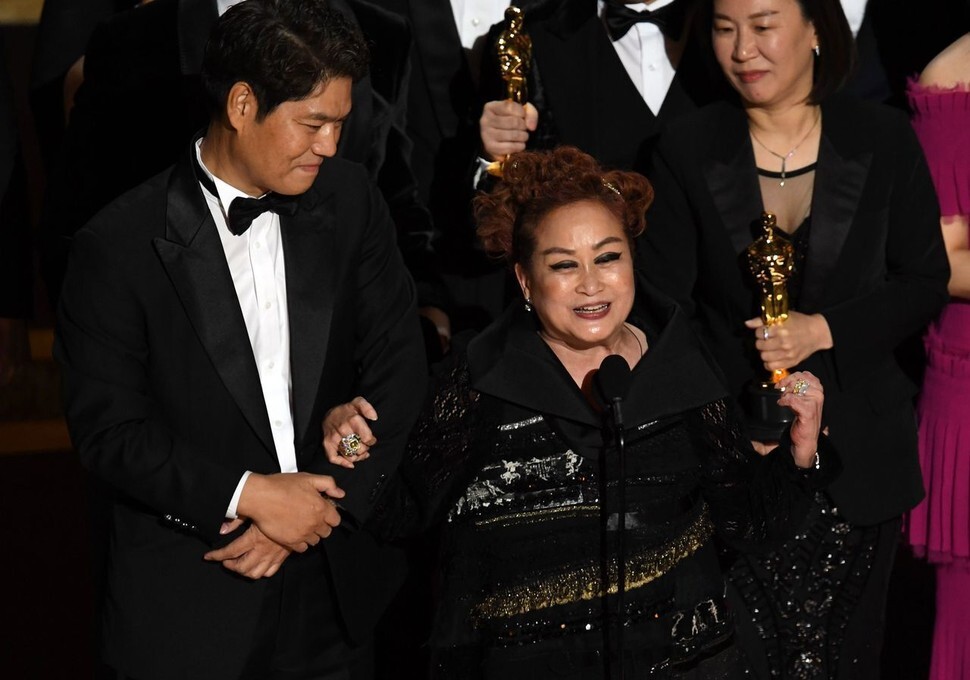hankyoreh
Links to other country sites 다른 나라 사이트 링크
CJ vice chair’s “Parasite” acceptance speech raises eyebrows at 2020 Oscars

An acceptance speech by CJ Group Vice Chair Lee Mi-kyung after director Bong Joon-ho’s film “Parasite” won the Academy Award for best picture has been sparking criticism.
The best picture Oscar is traditionally given to a film’s producer. On the Academy’s website, the awardee list shows the names of Barunson E&A CEO Kwak Sin-ae and director Bong Joon-ho. Kwak delivered her acceptance speech first when the award was given. Just as Lee was moving in front of the microphone, the lights went out; they were turned back on after actors in the front row called for the speeches to continue. Lee proceeded to speak at some length -- even making sure to include a message of thanks to her younger brother, CJ Group Chairman Lee Jay-hyun. Her appearance sparked both curiosity among viewers wondering who she was, as well as questions from critics as to whether she should have been appearing instead of the actors or director.
Lee is listed as the “chief producer” for “Parasite.” A somewhat unusual title in the film industry, it is a role more accurately characterized as “investor.”
Lee continued investing in and supporting Bong’s films even amid censorship efforts during the Park Geun-hye administration and spent over 10 billion won (US$8.49 million) on a publicity campaign for the Oscars. CJ commented that her contributions were “more than enough to qualify her to give an acceptance speech” -- and quite a number of people agree.
Others recognized Lee’s contribution but suggested that she was going overboard by stepping into the limelight.
“I’ve never once seen Lee Mi-kyung make a formal appearance in Chungmuro [the center of the South Korean film industry],” said critic Jeong Ji-wook. “It was rather questionable for her to be taking center stage with her unusual ‘chief producer’ title at the Academy Awards, which investors are not eligible to attend.”
Kang Yu-jeong, a professor at Kangnam University, said, “Lee Mi-kyung has obviously contributed to the advancement of South Korean cinema, but it would have been better she’d quietly remained an ‘invisible hand’ all along.”
Revealing both lighter and darker sides of S. Korean cinemaObservers also said the moment illustrated both the lighter and darker sides of the South Korean film industry.
“It’s true that vertical integration by the kind of large corporations exemplified by CJ has been a foundation for the South Korean film industry’s swift growth,” Kang acknowledged.
“But the result of this has been uniformity in cinema, which focuses on large-scale commercial films, and that’s had the side effect of creating an environment where it’s more difficult for talented newcomers to emerge to become the ‘next Bong Joon-ho,’” she added, explaining that Lee’s actions “illustrated both these benefits and drawbacks.”
Some are also suggesting that Lee should work proactively to contribute to balanced development in South Korean cinema. Jeong Ji-wook said that Lee “needs to play a responsible role for the sake of South Korean film.”
“She should take concrete steps by easing the oligopoly and supporting independent film,” he suggested.
By Suh Jung-min, music correspondent
Please direct comments or questions to [english@hani.co.kr]

Editorial・opinion
![[Editorial] Intensifying US-China rivalry means Seoul must address uncertainty with Beijing sooner than later [Editorial] Intensifying US-China rivalry means Seoul must address uncertainty with Beijing sooner than later](https://flexible.img.hani.co.kr/flexible/normal/500/300/imgdb/original/2024/0517/8117159322045222.jpg) [Editorial] Intensifying US-China rivalry means Seoul must address uncertainty with Beijing sooner than later
[Editorial] Intensifying US-China rivalry means Seoul must address uncertainty with Beijing sooner than later![[Column] When ‘fairness’ means hate and violence [Column] When ‘fairness’ means hate and violence](https://flexible.img.hani.co.kr/flexible/normal/500/300/imgdb/original/2024/0516/7417158465908824.jpg) [Column] When ‘fairness’ means hate and violence
[Column] When ‘fairness’ means hate and violence- [Editorial] Yoon must stop abusing authority to shield himself from investigation
- [Column] US troop withdrawal from Korea could be the Acheson Line all over
- [Column] How to win back readers who’ve turned to YouTube for news
- [Column] Welcome to the president’s pity party
- [Editorial] Korea must respond firmly to Japan’s attempt to usurp Line
- [Editorial] Transfers of prosecutors investigating Korea’s first lady send chilling message
- [Column] Will Seoul’s ties with Moscow really recover on their own?
- [Column] Samsung’s ‘lost decade’ and Lee Jae-yong’s mismatched chopsticks
Most viewed articles
- 1[Editorial] Transfers of prosecutors investigating Korea’s first lady send chilling message
- 2Celine Song says she’s gratified global audiences have responded to the kismet of ‘inyeon’
- 3[Exclusive] Unearthed memo suggests Gwangju Uprising missing may have been cremated
- 4For new generation of Chinese artists, discontent is disobedience
- 5[Column] US troop withdrawal from Korea could be the Acheson Line all over
- 6Could Korea’s Naver lose control of Line to Japan?
- 7Xi, Putin ‘oppose acts of military intimidation’ against N. Korea by US in joint statement
- 8Yoon ridicules critics of Fukushima dumping in first comments since release began
- 9Five Ukrainians share how their lives have changed two years into war
- 10[Editorial] Intensifying US-China rivalry means Seoul must address uncertainty with Beijing sooner t